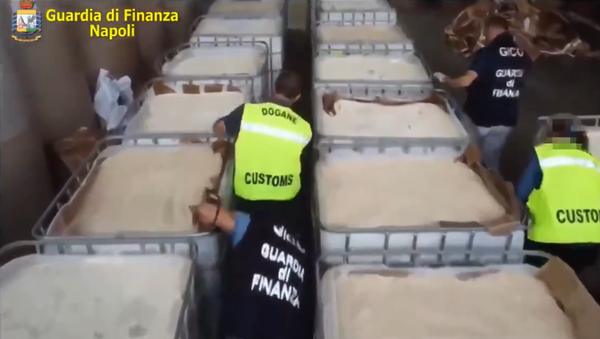"We know that [Daesh] finances its terrorist activities mainly by trafficking drugs made in Syria, which in the past few years has become the world's largest producer of amphetamines," Italian police said on Wednesday, as reported by CBS News.
According to Italy’s Guardia di Finanza military police force, an estimated 84 million tablets were seized after authorities became suspicious of three containers that were expected to arrive at the Italian port of Salerno, around 32 miles south of Naples. The drugs are estimated to be worth some $1.12 billion.
#GDF #Napoli, sequestro record di 14 tonnellate di #anfetamine: 84 milioni di pasticche prodotte in #Siria da ISIS/DAESH per finanziare il #terrorismo. Oltre 1 miliardo di euro il valore sul mercato. #NoiconVoi pic.twitter.com/McdOljNxa5
— Guardia di Finanza (@GDF) July 1, 2020
Authorities noted that the amphetamines in question came in the form of tablets of captagon - a drug commonly used by Daesh because it gives the user delusions of grandeur that inhibit fear and pain.
The Guardia di Finanza explained that because of these effects, captagon is often referred to as the “jihad drug.”
This comes less than two weeks after a group of foreign-backed terrorists were reportedly arrested during a bust by the Syrian Army and local authorities in the countryside near Damascus, Syria.
According to the Syrian Arab News Agency, dozens of sniper rifles, rocket-propelled grenades, anti-tank missiles and other weapons were seized from the site, along with over 100 large bags of narcotics. The drugs found are believed to be captagon tablets.
Prior to the June bust in Syria, the Greek Finance Ministry's Financial Crimes Unit announced in July 2019 that it had obtained 5.79 tons (5.25 tonnes) of captagon tablets from a June 27, 2019, bust on a foreign vessel.
The ship, which arrived in Greece from Syria, was bound for China in an apparent attempt to avoid any suspicion before the tablets would be sold in the Middle East.
Captagon was first developed by scientists to treat depression, hyperactivity and other disorders in the 1960s, but has since been banned across the world due to its addictive nature, reported CBS News.
Lebanese psychiatrist Ramzi Haddad told Reuters that the drug is simple to produce, and “only basic knowledge of chemistry and a few scales” are necessary. As a result, many at-home laboratories are used to manufacture captagon.


